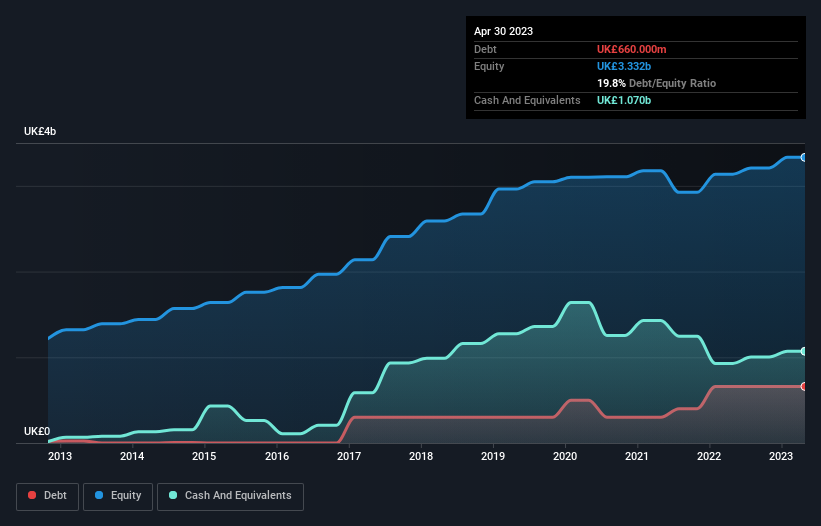- United Kingdom
- /
- Consumer Durables
- /
- LSE:BKG
We Think Berkeley Group Holdings (LON:BKG) Can Stay On Top Of Its Debt
Some say volatility, rather than debt, is the best way to think about risk as an investor, but Warren Buffett famously said that 'Volatility is far from synonymous with risk.' When we think about how risky a company is, we always like to look at its use of debt, since debt overload can lead to ruin. As with many other companies The Berkeley Group Holdings plc (LON:BKG) makes use of debt. But should shareholders be worried about its use of debt?
Why Does Debt Bring Risk?
Debt assists a business until the business has trouble paying it off, either with new capital or with free cash flow. In the worst case scenario, a company can go bankrupt if it cannot pay its creditors. While that is not too common, we often do see indebted companies permanently diluting shareholders because lenders force them to raise capital at a distressed price. By replacing dilution, though, debt can be an extremely good tool for businesses that need capital to invest in growth at high rates of return. When we examine debt levels, we first consider both cash and debt levels, together.
See our latest analysis for Berkeley Group Holdings
How Much Debt Does Berkeley Group Holdings Carry?
As you can see below, Berkeley Group Holdings had UK£660.0m of debt, at April 2023, which is about the same as the year before. You can click the chart for greater detail. However, it does have UK£1.07b in cash offsetting this, leading to net cash of UK£410.4m.

How Healthy Is Berkeley Group Holdings' Balance Sheet?
We can see from the most recent balance sheet that Berkeley Group Holdings had liabilities of UK£1.89b falling due within a year, and liabilities of UK£1.64b due beyond that. Offsetting these obligations, it had cash of UK£1.07b as well as receivables valued at UK£70.3m due within 12 months. So its liabilities outweigh the sum of its cash and (near-term) receivables by UK£2.39b.
Berkeley Group Holdings has a market capitalization of UK£4.25b, so it could very likely raise cash to ameliorate its balance sheet, if the need arose. However, it is still worthwhile taking a close look at its ability to pay off debt. Despite its noteworthy liabilities, Berkeley Group Holdings boasts net cash, so it's fair to say it does not have a heavy debt load!
The good news is that Berkeley Group Holdings has increased its EBIT by 2.0% over twelve months, which should ease any concerns about debt repayment. When analysing debt levels, the balance sheet is the obvious place to start. But it is future earnings, more than anything, that will determine Berkeley Group Holdings's ability to maintain a healthy balance sheet going forward. So if you want to see what the professionals think, you might find this free report on analyst profit forecasts to be interesting.
Finally, while the tax-man may adore accounting profits, lenders only accept cold hard cash. Berkeley Group Holdings may have net cash on the balance sheet, but it is still interesting to look at how well the business converts its earnings before interest and tax (EBIT) to free cash flow, because that will influence both its need for, and its capacity to manage debt. In the last three years, Berkeley Group Holdings's free cash flow amounted to 34% of its EBIT, less than we'd expect. That's not great, when it comes to paying down debt.
Summing Up
Although Berkeley Group Holdings's balance sheet isn't particularly strong, due to the total liabilities, it is clearly positive to see that it has net cash of UK£410.4m. And it also grew its EBIT by 2.0% over the last year. So we are not troubled with Berkeley Group Holdings's debt use. The balance sheet is clearly the area to focus on when you are analysing debt. But ultimately, every company can contain risks that exist outside of the balance sheet. For example, we've discovered 2 warning signs for Berkeley Group Holdings (1 makes us a bit uncomfortable!) that you should be aware of before investing here.
If, after all that, you're more interested in a fast growing company with a rock-solid balance sheet, then check out our list of net cash growth stocks without delay.
Valuation is complex, but we're here to simplify it.
Discover if Berkeley Group Holdings might be undervalued or overvalued with our detailed analysis, featuring fair value estimates, potential risks, dividends, insider trades, and its financial condition.
Access Free AnalysisHave feedback on this article? Concerned about the content? Get in touch with us directly. Alternatively, email editorial-team (at) simplywallst.com.
This article by Simply Wall St is general in nature. We provide commentary based on historical data and analyst forecasts only using an unbiased methodology and our articles are not intended to be financial advice. It does not constitute a recommendation to buy or sell any stock, and does not take account of your objectives, or your financial situation. We aim to bring you long-term focused analysis driven by fundamental data. Note that our analysis may not factor in the latest price-sensitive company announcements or qualitative material. Simply Wall St has no position in any stocks mentioned.
About LSE:BKG
Berkeley Group Holdings
The Berkeley Group Holdings plc, together with its subsidiaries, builds homes and neighbourhoods in the United Kingdom.
Excellent balance sheet and fair value.
Similar Companies
Market Insights
Community Narratives



